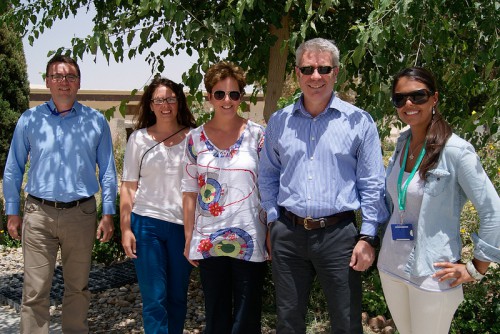
The following is a guest post by FCO Human Resources Director Menna Rawlings on her recent visit to Helmand PRT.
I recently visited the Provincial Reconstruction Team in Lashkar Gah. As the Foreign Office HR Director, I often feel that I need to get out more. It’s easy to get stuck behind my desk in London, thinking about our global workforce (over 14,000 staff in 270 posts around the world). But I get a fresh perspective by getting out and talking to our staff about what’s on their minds.
A former colleague of mine used to call this getting “dust on shoes” reflecting, he said, the need for diplomats to get out and about to understand the countries in which they serve.
The same principle applies, in spades, in HR. It’s easy to invent people policies in London, but without talking to those who are on the receiving end, and understanding what is and isn’t working, there’s a risk of becoming divorced from the realities people face on the ground – including in difficult places like Afghanistan.
So here I was in Helmand. More dust than I could wish for. Not to mention body-armour, helicopters, and hours hanging around in Camp Bastion waiting for flights. All of this was pretty much expected. Other things less so.
To start with, the PRT is more of an oasis than I might have imagined, with some green spaces and decent recreational facilities. Easy to forget, for a while, the heavily-fortified nature of the compound, and the continuing threat which all our staff face in doing their jobs.
It was also great to see people working across different boundaries. Civilian and military staff from across the British Government, under the overall leadership of Catriona Laing. But also international partners working alongside the UK – the Danes, the US and (until recently) the Estonians.
In many posts, we still struggle to have a truly joined-up team which is much more than the sum of the Whitehall parts. But in Lashkar Gah, there really is a sense of One Team, despite the usual systemic issues. These were as bad in the PRT as anywhere – 10 different IT systems, 4 telephone systems, complex lines of reporting and accountability. The difference was the collective will to overcome them and to work together.
It was also a privilege to meet our Local Staff, who have contributed in so many ways to the gains in recent years – on health, education, infrastructure and political voice in Helmand. I heard concerns from our Afghan staff about what would happen after drawdown next year, and the fears some of them had for themselves and their families as a result of their association with the PRT.
In a week when stories on this subject were all over the British press (ahead of a final decision and announcement), I explained what I knew – and what was still to be decided. But I was at least able to reassure that their voice was being heard, and that – as the PM had said – we were not in the business of turning our backs on Helmand or our staff.
I finished my trip with two days in Kabul talking to staff and international partners there, before heading back to the UK.
Looking back on my visit now, on a cool and rainy day in London, I can say it was an inspirational experience. I am left feeling an urge to tell people about the successes of our mission in Helmand, rather than (as the press inevitably does) focus relentlessly on the negatives. But also to say – wow! Look what amazing staff we have working for the British Government in Afghanistan. And look at the dedication, resilience, expertise and optimism they show in the most difficult of circumstances.
A terrific example of achieving Diplomatic Excellence through People, which is what my job is all about.
Menna Rawlings
